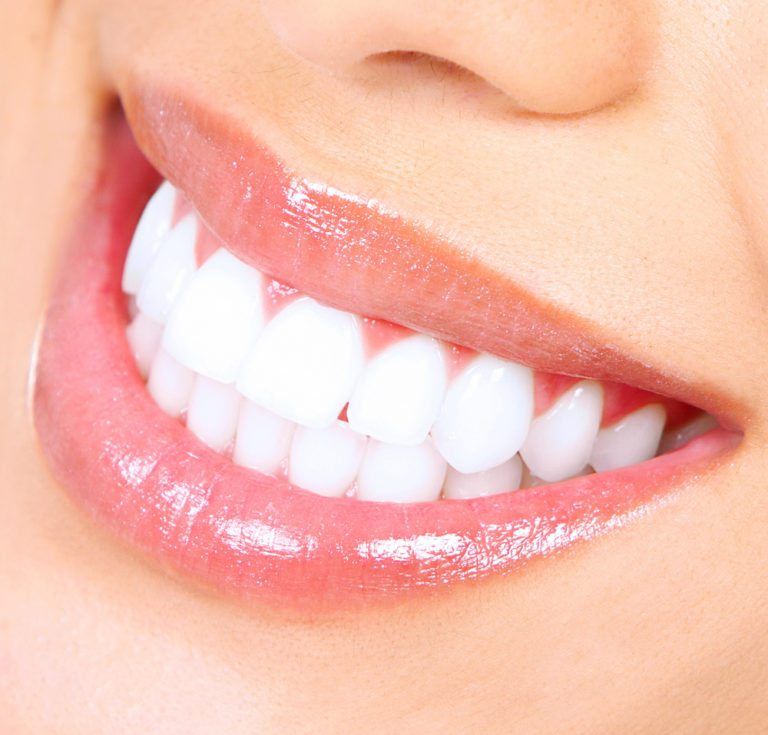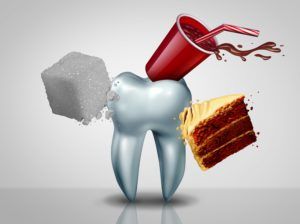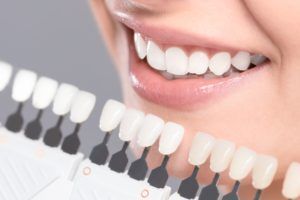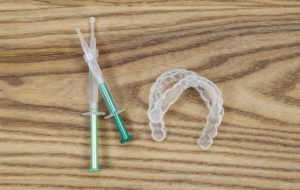Teeth Whitening

Teeth whitening is a cosmetic dental procedure that removes stains and brightens the color of your teeth. It works by removing both intrinsic and extrinsic stains from the enamel and dentin layers of your teeth. Professional teeth whitening sessions are performed in our office and a single session can whiten your teeth up to 5-10 shades.
Did You Know?
Your teeth absorb substances much like a sponge would. This means that stains are caused by the absorption of highly pigment materials and removed by the absorption of whitening agents.
Frequently Asked Questions:
Am I a candidate for teeth whitening?
You may be a candidate for teeth whitening if you have discolored, but otherwise healthy teeth. Additionally, you may also be a candidate for teeth whitening if you are planning to have a dental restoration placed and want the dental restoration to match your whitened teeth. However, if you have extensive tooth decay or gum disease, you may not be an ideal candidate for teeth whitening. To find out if teeth whitening is the right choice for you, schedule a consultation with Dr. Simpson at Appletree Dentistry today!
What are intrinsic and extrinsic stains?
Intrinsic and extrinsic stains are two different types of stains that cause your teeth to become discolored. Intrinsic stains affect the dentin, or middle layer, of your teeth and are caused by aging, certain medications, and excess fluoride. Because the majority of intrinsic stains are simply the result of aging, they cannot be prevented.

Extrinsic stains, on the other hand, are stains affecting the enamel, or outermost layer, of your teeth and are caused by external factors such as poor dental hygiene and the consumption of certain foods and beverages. Because extrinsic stains are caused by external factors, they are easier to prevent by simply improving oral hygiene and limiting the amount of highly pigmented foods and beverages consumed.
How does teeth whitening work?
Teeth whitening works by allowing a hydrogen peroxide or carbamide peroxide solution to be absorbed into your teeth. Once absorbed, the hydrogen peroxide or carbamide peroxide reacts with discolored molecules in your teeth by breaking the bonds that hold them together, eliminating the stains from inside your teeth.
What is the difference between over the counter whitening and professional teeth whitening?
There are two main differences between over the counter whitening and professional teeth whitening: who is applying the whitening solution and how strong the whitening solution is. With over the counter whitening treatments, you are in charge of preparing the whitening trays and applying them to your teeth. With professional teeth whitening, a dental professional will be applying the whitening solution, while also protecting your gums at the same time. This means that with professional teeth whitening, you have a decreased risk of gum irritation.
Also, over the counter teeth whiteners are not as strong as the whitening solutions used during professional teeth whitening. This is again because only a dental professional can safely apply higher concentrations of whitening solution. Because the whitening solution used for professional teeth whitening is a higher concentration, the end result will be far more quick and dramatic than those obtained with over the counter whitening products.
What can I expect when receiving teeth whitening services at Appletree Dental?

When receiving teeth whitening services at Appletree Dental, you can first expect to have your teeth professionally cleaned to remove any plaque, tartar, and bacteria from your mouth, as well as to ensure there is a smooth surface for the whitening compound to adhere to. Once your teeth have been thoroughly cleaned, your teeth will be isolated from your gums and lips. This is because the whitening compound can irritate the soft tissues in your mouth.
After your teeth have been properly prepared, the whitening compound will be brushed onto the surface of your teeth. Depending on the type of compound used, a special activating light may also be used to help the product penetrate your tooth. The whitening compound will be left in place for about 30-60 minutes, depending on the initial tooth color and desired results. Your teeth will then be rinsed to remove the product and then polished.
What can I expect after receiving teeth whitening services at Appletree Dentistry?
After receiving teeth whitening services you will want to avoid eating or drinking highly pigmented substances for at least 24 hours following your procedure. This is because the whitening compound will continue to break down discolored molecules in your teeth for 24 hours after its initial application, and adding more stains will decrease the overall results.

Depending on your desired results, Dr. Simpson may also prescribe take-home trays to use in the weeks following your teeth whitening treatment. If this is the case, he will provide you with directions on how often and how long to wear the trays. For the best treatment outcome, it is essential to follow his directions.
In the days following your teeth whitening treatment, you may experience a brief period of tooth sensitivity or gum irritation. This is normal and will usually disappear within a few days. If, however, it persists for over a week, call our office for further instructions.
Are there any risks associated with teeth whitening?
Teeth whitening is considered to be a safe treatment. The hydrogen or carbamide peroxide used to whiten teeth will eventually break down into water and can safely be absorbed by the body. However, teeth whitening can pose minor risks such as gum irritation, tooth sensitivity, and technicolor teeth.
Although hydrogen and carbamide peroxide work well to whiten teeth, they can irritate the gums and soft tissues of the mouth. While Dr. Simpson will do everything possible to protect your gums from coming into direct contact with the whitening agents, there may still be some minor irritation where the gums meet your teeth. Generally, this irritation is mild and will fade within a few days of the procedure.
After whitening your teeth, you may also notice a sensitivity to hot and cold temperatures, as well as sweet foods. This is called tooth sensitivity and it sometimes occurs after teeth whitening because the nerves in the dentin layer can become sensitive. To reduce the chances of tooth sensitivity, you may be recommended to brush with sensitivity toothpaste for a week before and after your teeth whitening treatment.
The final risk of teeth whitening is technicolor teeth. Technicolor teeth is the name given to teeth that do not whiten evenly. This usually occurs because there are fillings or dental restorations already in the mouth that will not whiten while the natural tooth structure around them whitens. To avoid technicolor teeth, you should have dental restorations placed or replaced after you whiten your teeth.
For simply great dental care, schedule a consultation with your Tigard dentist, Dr. Scott T. Simpson of Appletree Dentistry today!


